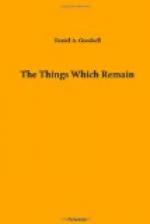[Sidenote: An Anthropomorphic God.]
More, too, is made of His life before the Incarnation. The pre-existence of Christ is an essential element in Christianity. “His eternal relation to God is the only way of conceiving Him which answers to His real greatness."[4] The Christ was present and active in the creation. John’s use of the word “Logos” is right. “Logos” is not merely a result but a Force. It is not only the speech, but the speaker. Let us admit once for all that the fact, much belabored of the critics, is a fact. Let us not be afraid of the word which expresses it. God must be anthropomorphic if He exists. We can come nowhere near to thinking out any other kind of God. Christ has the value of God to devout Christians because in the fullness of His moral perfections He expresses God so far as we can know Him and man so far as man can hope and grow.
[Footnote 4: Denney. Studies in Theology.]
[Sidenote: How Son of God.]
Is His Sonship different from ours, or only an expansion of the fullness and perfection of our sonship? This last seems to me a most important question. If He was born as we were born—that is, as to the beginning of His earthly life, there can be no pre-eminent sense in which He was the Son of God. He was either a happy accident of natural birth or a “sport” in evolution.
[Sidenote: The Virgin Birth.]
This brings us to that doctrine which is the greatest challenge to the doubter: “Conceived by the Holy Ghost; born of the Virgin Mary,”—a doctrine fiercely fought by Harnack and yet by no means to be dismissed as he dismisses it. His teaching on this point seems to me the result of his theory of Christianity. If one seeks to rid Christianity of the supernatural, here is the place to begin.
[Sidenote: Dignity of the Story.]
[Sidenote: A Greater Puzzle.]
But who will not feel the force of the position that, granted God was to be incarnate, the story of Christ’s incarnation is the noblest and most probable? He is not born of a man’s lust nor of a woman’s desire—but of the submission of untainted womanhood to the direct creative power of God. The alternative to this is the Divinest man in all the world born of sinning and not yet married parents. If the new doctrine of heredity be true that men may inherit good as well as evil, we still have an astounding fact to account for; namely, the birth of such a child from such conditions, that is, with all the good kept in and all the bad left out.
[Sidenote: Parthenogenesis a Fact.]
When men speak of a virgin birth as incredible and impossible and as the weakest of all Christian doctrine, do they know or have they forgotten that parthenogenesis (virgin birth) is a fact in nature; existing, for example, in as highly organized insects as the honey bee? There are other insects which are parthenogenetic at one time and sexually productive at another. There are also hints of it in human life known to anatomists which can not be fully discussed here.




